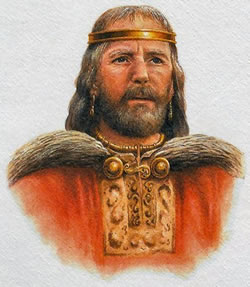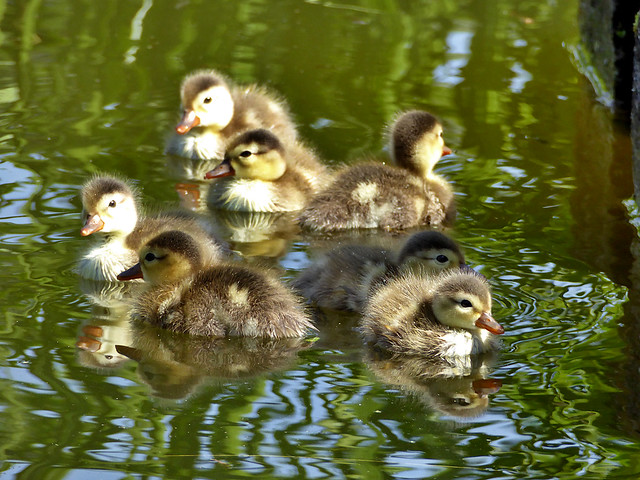Words for king and related things in Celtic languages.

Brian Boru, High King of Ireland (1002-1014) / Brian Bóruma mac Cennétig, Ard-Rí ar Éirinn
| Proto-Celtic | *rīxs/*rig- = king |
|---|---|
| Celtiberian | reikis = king |
| Gaulish | rīx = king – appears in names like Katurīx, Suādurīx, *Werkingetorīx (Vercingetorix) and Asterix |
| Primitive Irish | ᚏᚔᚌᚐᚄ (rigas) = (of the) king |
| Old Irish (Goídelc) | rí [r͈ʲiː] = king rígdae = regal, kingly rígdún = palace |
| Middle Irish (Gaoidhealg) | rí, ríg, rig = king, head, chief rígán = a sub-king, chief rígamail, rioghamhail = royal rígdacht = kingliness, kingly qualities, a kingdom rígda(e) = a royal dwelling place, palace rígrach = = royal, kingly |
| Irish (Gaeilge) | rí [ɾˠiː] = king, sovereign, monarch ríoga = regal, royal ríora = kings, royal persons, royalty, dynasty |
| Scottish Gaelic (Gàidhlig) | rìgh [r̪ʲiː] = king banrìgh = queen àrd-rìgh = high king mòr-rìgh = emperor rìoghachadh = reigning, reign rìoghachd = kingdom, realm |
| Manx (Gaelg) | ree = king reejerey = cavalier, chevalier, king, knight, lord, paladin, prince reeoil = kinglike, monarchy, regal, royal reeaght, reeriaght, riaght, ream = kingdom |
| Proto-Brythonic | *riɣ [ˈriːɣ] = king |
| Old Welsh | rig = king |
| Middle Welsh (Kymraec) | ri, rhi = king rhiaidd, rhïaidd = regal, royal, noble, generous rieu, riav = king, lord, ruler, chieftain rriawdr, riawdr = lord, ruler, chieftain, God |
| Welsh (Cymraeg) | rhi [r̥iː] = king, prince, lord, ruler, chieftain rhiaidd = regal, noble, aristocratic, dignified rhiau = king, lord, ruler, chieftain rhiawdr = lord, ruler, chieftain, God |
| Middle Cornish (Cernewec) | ruy, ruif = king, sovereign, ruler ryal, real = royal, kingly |
| Cornish (Kernewek) | riel = regal, royal |
| Old Breton | ri = king |
| Middle Breton (Brezonec) | ri, rí = king |
Etymology: from Proto-Indo-European *h₃rḗǵs (king, ruler) [source], which is also the root of the German word Reich (empire, realm), and the English suffix -ric, as in bishopric (a diocese or region of a church which a bishop governs) [source].
| Proto-Celtic | *rīganī= queen |
|---|---|
| Gaulish | rigani = queen |
| Old Irish (Goídelc) | rígan = queen |
| Middle Irish (Gaoidhealg) | rígain, rígan, rígnae = queen, noble lady |
| Irish (Gaeilge) | ríon = queen, queenly, noble, lady, fair maiden banríon = queen (ban)ríonacht = queenship ríonaí = queenly ríonaigh = to queen (chess) |
| Scottish Gaelic (Gàidhlig) | rìghinn [r̪ʲi.ɪn̪ʲ] = princess (archaic) rìbhinn [r̪ʲiːvɪn̪ʲ] = maid, maiden, girl, Venus, adder, queen (archaic) banrìgh = queen |
| Manx (Gaelg) | reeven = queen rein = queen ben-rein = queen |
| Proto-Brythonic | *rriɣėn [r͈iˈɣe̝ːn] = queen |
| Middle Welsh (Kymraec) | riein, riain = (young) woman, girl, damsel, lass, maiden, virgin, queen, noble girl, lady |
| Welsh (Cymraeg) | rhiain = (young) woman, girl, damsel, lass, maiden, virgin, queen, noble girl, lady |
Etymology: from Proto-Indo-European *h₃rḗǵnih₂ (queen), from *h₃rḗǵs (king, ruler) [source]. Words from the same roots include reine (queen) in French, reina (queen) in Spanish, erregina (queen) in Basque, and regină (queen) in Romanian [source].
| Middle Welsh (Kymraec) | rhỼyf, rwyf, rỼy = king, lord, ruler, chieftain, leader rwyfaỼ, rwyfaỼ = to have dominion over, govern, rule rwyuannus, rhwyvanus = royal, kinglike, governing ruyvenit = prince, king, ruler rhwyfiadur, ruyfadur, rwyfyadur, rỼyfyadur = chief(tain), lord, leader, ruler, protector |
|---|---|
| Welsh (Cymraeg) | rhwy(f) = king, lord, ruler, chieftain, leader rhwyfo = to have dominion over, govern, rule, lead, be ostentatious, live in splendour rhwyfanes = queen, lady rhwyfaniad = reign, government, rule, kingdom rhwyfanus = royal, kinglike, governing rhwyfenydd = prince, king, ruler rhwyf(i)adur = chief(tain), lord, leader, ruler, protector |
| Old Cornish | ruifanes = queen ruifadur = chief(tain), lord, leader |
| Middle Cornish (Cernewec) | ruy, ruif = king, sovereign, ruler ruifanes, ruivanes = a female ruler, queen |
| Cornish (Kernewek) | ruvanes = queen ruvaneth = kingdom |
| Old Breton | roe = king |
| Middle Breton (Brezonec) | roe, roé, roue, rouè = king rouanes, roanez, rouanés = queen rouantelez, roeantelez = kingdom roueel = royal roueeler = royalist roueelezh = royalty roueelouriezh = royalism roueoni = reign |
| Breton (Brezhoneg) | roue = king rouanez = queen rouantelezh = kingdom, monarchy roueel = royal roueelezh = royalty roueelouriezh = royalism |
Etymology: from Old French roi (king), from Latin rēgem (king, ruler, despot, tyrant), from Proto-Italic *rēks (king), from Proto-Indo-European *h₃rḗǵs (king, ruler) [source].
Words from the same Latin root include re (king) in Italian, roi (king) in French, viceroy in English and rey (king) in Spanish [source].
| Proto-Celtic | *brigantīnos = (someone) pre-eminent, outstanding |
|---|---|
| Proto-Brythonic | *brɨɣėntin [brɨɣe̝nˈtiːn] = lord, king |
| Middle Welsh (Kymraec) | breenhin, breennin, breyenhin, brenhin = king brenhynes, brenhines = queen, goddess, queen bee brenineiziaw = to become kingly brenhynyaeth, brenhinyaeth = royalty, kingship, reign |
| Welsh (Cymraeg) | brenin [ˈbrɛnɪn / ˈbreːnɪn] = king, sovereign, monarch, head of region brenineiddio = to make/become regal/kingly, make (sb) a king breninesaidd = queen-like, queenly breninesol = queen-like, queenly, pertaining to a queen breningarol = royalist breniniaethu = to reign, govern breninoldeb = kingship, royalty brenhines = queen, goddess, queen bee brenhiniaeth = royalty, kingship, reign, government |
| Middle Cornish (Cernewec) | brentyn, bryntyn = privileged, sovereign, noble, excellent |
| Cornish (KerneweK) | bryntin, brentin = grand, great, noble, splendid, superb |
| Old Breton | brientin, brientinion = king |
| Middle Breton (Brezonec) | brientin = aristocrat brientinelezh = aristocracy |
| Breton (Brezhoneg) | brientin = aristocrat brientinel = aristocratic brientinelezh = aristocracy brienteg, brientek = privileged brientekaat = to favour briental = royalties |
Etymology: from Proto-Indo-European *bʰérǵʰonts (high), from *bʰerǵʰ- (to rise up, ascend) [source].
From the same Proto-Celtic root, , we get the tribal name *Brigantī (Brigantes – a Celtic tribe that occupied much of what is now northern England), Brigantia (a Celtic goddess of victory, and the territory of the Brigantes), the name Bridget, the Irish name Bríd, the Scottish Gaelic name Brìghde, the Manx name Breeshey, and the placenames such as Bragança (a city in northeastern Portugal), Bregenz (a city in western Austria) and Brianza (a city in northern Italy), [source].
English words from the same PIE root include bourgeois, burrow, fort and maybe burgler [source].
| Middle Welsh (Kymraec) | mechdeyrn, mychdeyrn, machdeyrn = king, lord, monarch, emperor mechteyrnged, mychteyrnged = tribute due to an overlord from an inferior lord |
|---|---|
| Welsh (Cymraeg) | mechdeyrn, mychdeyrn, machdeyrn = king, lord, monarch, emperor, God, tributary prince, viceroy mechdeyrnged, mychdeyrnged = tribute due to an overlord from an inferior lord |
| Middle Cornish (Cernewec) | mychtern = sovereign, king mychternes = queen mychterneth = sovereignity, dominion, royalty, kingdom |
| Cornish (Kernewek) | myghtern, metern [mɪx’tɛrn] = king, monarch myghternes, meternes = monarch, queen myghterneth, meterneth = kingdom myghternses, meternses = kingship, monarchy |
| Old Breton | machtiern = king |
Etymology: from Welsh mach (surety, guarantor, sponsor, hostage) and teyrn (sovereign, monarch, king) [source].
Source: Gerlyver Kernewek, Geiriadur Prifysgol Cymru
Words marked with a * are reconstructions.
Sources: Wiktionary, Am Faclair Beag, Online Manx Dictionary, Teanglann.ie, eDIL – Electronic Dictionary of the Irish Language, In Dúil Bélrai English – Old Irish glossary, Geiriadur Prifysgol Cymru, Gerlyver Kernewek, Dictionaire Favereau, TermOfis, English – ProtoCeltic WordList (PDF), Etymological Dictionary Of Proto Celtic









